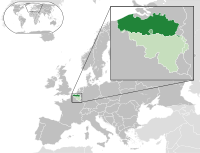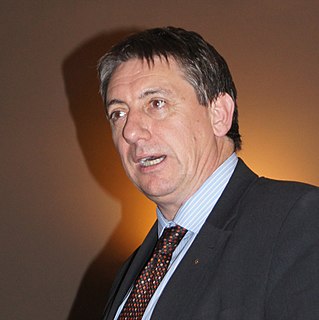
The Minister-President of Flanders is the head of the Flemish Government, which is the executive branch of the Flemish Region and Flemish Community.

Open Flemish Liberals and Democrats, commonly known as Open VLD or simply as the VLD, is a conservative-liberal Flemish political party in Belgium. The party was created in 1992 from the former Party for Freedom and Progress (PVV) and politicians from other parties. The party led the government for three cabinets under Guy Verhofstadt from 1999 until March 2008. Open VLD most recently formed the Federal Government with N-VA, CD&V and the Francophone Reformist Movement (MR).

The New Flemish Alliance is a Flemish nationalist, conservative political party in Belgium. The party was founded in 2001 by members of the right-leaning faction of the People's Union (VU). The N-VA is a regionalist, separatist movement that self-identifies with the promotion of civic nationalism. It is part of the Flemish Movement; the party strives for the peaceful and gradual secession of Flanders from Belgium. In recent years it has become the largest party of Flanders as well as of Belgium as a whole, and it participated in the 2014–18 Belgian Government until 9 December 2018.
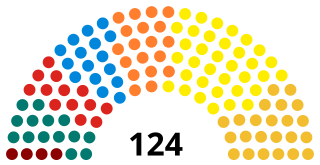
The Flemish Parliament constitutes the legislative power in Flanders for matters which fall within the competence of Flanders, both as a geographic region and as a cultural community of Belgium.

The Flemish Region is one of the three regions of the Kingdom of Belgium—alongside the Walloon Region and the Brussels-Capital Region. Colloquially, it is usually simply referred to as Flanders. It occupies the northern part of Belgium and covers an area of 13,625 km2 (5,261 sq mi). It is one of the most densely populated regions of Europe with around 483/km2 (1,250/sq mi).

The Vlaamse Gemeenschapscommissie is the local representative of the Flemish authorities in the Brussels-Capital Region, one of the three regions of Belgium. The VGC depends on the Flemish Parliament, and its council is made up by the members of the Dutch linguistic group of the Brussels Parliament, whereas its executive is made up of the two Flemish ministers and the Flemish secretary of the Brussels-Capital Government.

Flanders is both a cultural community and an economic region within the Belgian state, and has significant autonomy.

The Flemish Community is one of the three institutional communities of Belgium, established by the Belgian constitution and having legal responsibilities only within the precise geographical boundaries of the Dutch-language area and of the bilingual area of Brussels-Capital. Unlike in the French Community of Belgium, the competences of the Flemish Community have been unified with those of the Flemish Region and are exercised by one directly elected Flemish Parliament based in Brussels.

Flemish political parties operate in the whole Flemish Community, which covers the unilingual Flemish Region and the bilingual Brussels-Capital Region. In the latter, they compete with French-speaking parties that all also operate in Wallonia. There are very few parties that operate on a national level in Belgium. Flanders generally tends to vote for right-wing, conservative parties, whereas in French-speaking Belgium the socialist party is usually the most successful one.

The Flemish Government is the executive branch of the Flemish Community and the Flemish Region of Belgium. It consists of a government cabinet, headed by the Minister-President and accountable to the Flemish Parliament, and the public administration divided into 13 policy areas, each with an executive department and multiple agencies.
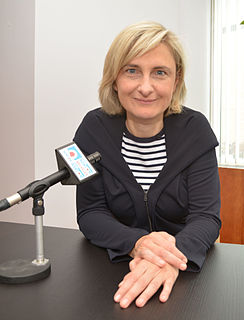
Hilde Urbanie Julia Crevits is a Belgian politician from Flanders and member of the Christian Democratic and Flemish party who is currently the Flemish minister of Education.
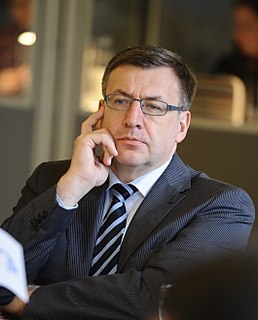
Steven Vanackere, is a Belgian politician from Flanders and member of the Christian Democratic and Flemish party (CD&V). He held the portfolios of Deputy Prime Minister of Belgium and Minister of Foreign Affairs and Institutional Reform in the Leterme II government. He is the son of Leo Vanackere, who, following a political career as a Member of the Chamber of Representatives and the Senate of Belgium, became the Provincial Governor of West-Flanders in 1979. His grandfather, Remi Wallays, had also been a senator and had been a former Mayor of Wevelgem.

Joke Schauvliege is a Belgian politician from Flanders.
Regional elections were held in Belgium on 25 May 2014 to choose representatives for the Flemish Parliament, Walloon Parliament, Brussels Parliament and the Parliament of the German-speaking Community. These elections were held on the same day as the 2014 European elections as well as the 2014 Belgian federal election.

The Bourgeois Government (Regering-Bourgeois) was the Flemish Government formed following the 2014 Flemish Parliament election. The cabinet consisted of a centre-right coalition of the nationalist New Flemish Alliance (N-VA), the Christian Democratic and Flemish party (CD&V) and the Open Flemish Liberals and Democrats. It had a large majority in the Flemish Parliament and the main opposition parties were the Socialist Party (sp.a), which had been part of nearly all previous governments in recent history, and the Green party.
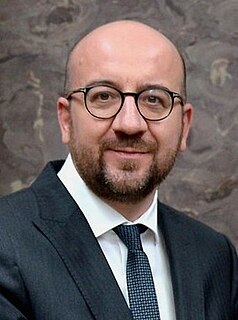
The Michel I Government was the Federal Government of Belgium formed following the 2014 Belgian government formation and sworn in on 11 October 2014. The administration is a centre-right coalition of the New Flemish Alliance (N-VA), the Christian Democratic and Flemish (CD&V), the Open Flemish Liberals and Democrats and the Reformist Movement (MR). The prime minister is Charles Michel. The government had an agenda of socio-economic reforms, especially through austerity measures, with its priorities being improving Belgium's economic competitiveness and reducing unemployment. It fell in December 2018 over the Global Compact for Migration.
The September Declaration is the annual government policy statement of Flanders in the form of a speech by the Minister-President of Flanders to the members of the Flemish Parliament. The Declaration, drafted by the Flemish Government, informs Parliament about the general state of Flemish society, and the main policy and budget plans for the next year.

The Michel II Government was the Federal Government of Belgium, led by Prime Minister Charles Michel from 18 December 2018 until 27 October 2019 when it was succeeded by the Wilmès I Government. It was a centre minority coalition cabinet of Christian Democratic and Flemish (CD&V), the Open Flemish Liberals and Democrats and the Reformist Movement (MR). On 26 October 2019, it was announced that Sophie Wilmès would take over the role of Prime Minister from Charles Michel ultimately on 1 November 2019, effectively forming a new government.

The Homans Government (Regering-Homans) was the interim Flemish Government formed and sworn in on 2 July 2019, following the departure of Flemish Minister-President Geert Bourgeois who took up his seat in the European Parliament following the 2019 European Parliament election in Belgium. It was replaced by the Jambon Government on 2 October 2019.

The Jambon Government (Regering-Jambon) is the Flemish Government formed and sworn in on 2 October 2019, following the 2019 Belgian regional elections and replacing the interim Homans Government.
















